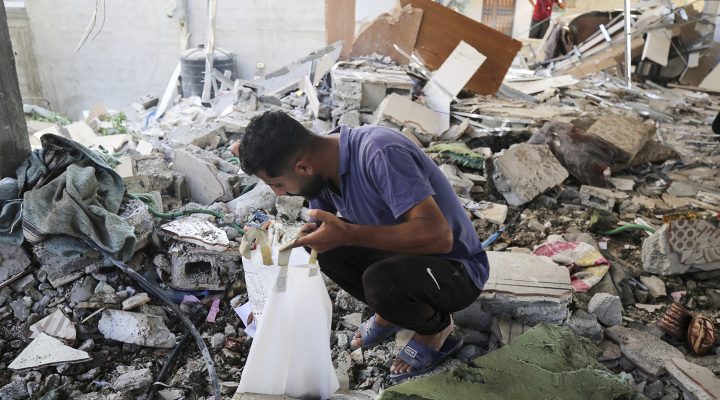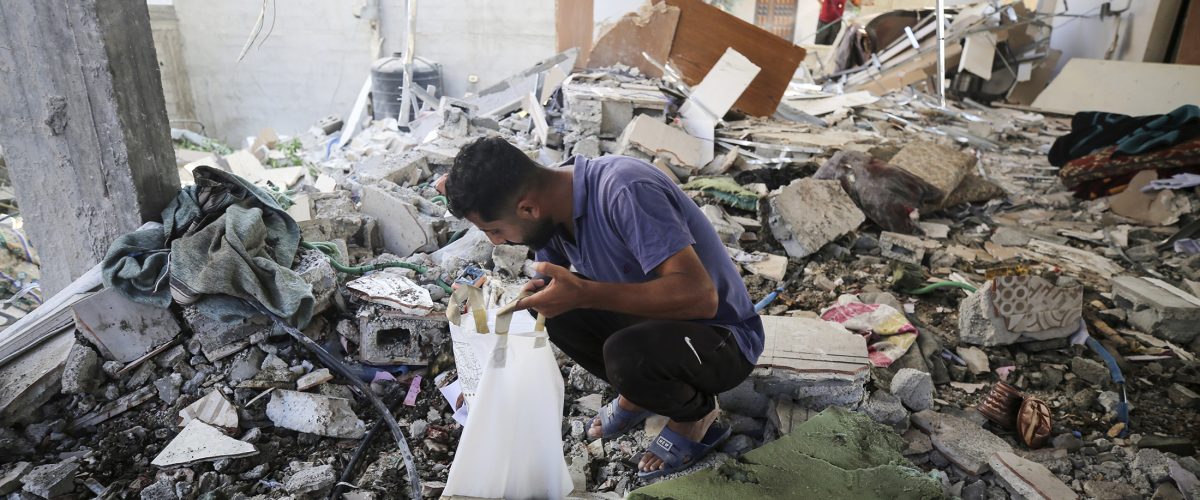In our age of advanced technology, where global connections are just a click away, a desperate cry echoes from the Gaza Strip — a cry from a land enduring the weight of more than 57 years of Israeli occupation and a brutal blockade that has suffocated it for more than 17 years. Gaza’s suffering is not merely a tale of survival; it is a stark testament to the fragility of human connections, unraveling in the cruel hands of geopolitical power struggles.
For the past 10 months, the people of Gaza have watched in despair as their infrastructure crumbles around them, particularly the networks that connect them to each other and to the outside world. This devastation has not only severed vital lifelines but has also deepened the emotional and psychological scars borne by Palestinians, both in Gaza and across the globe.

Jack Nassar
As followers of Christ, we are reminded in 1 Corinthians 12:26, “If one part suffers, every part suffers with it.” The genocide in Gaza is far more than a geopolitical crisis; it is a deeply human tragedy that beckons us, as Christians, to respond with compassion, prayer and unwavering action. Behind every news headline lies a story of heartbreak — a mother’s desperate tears, a father’s unspoken fears, children who long for the simple comfort of a voice on the other end of a call.
Imagine the terror of an injured person, trapped in the ruins of what was once their home, unable to reach out for help because the communication lines have been destroyed. How many lives have been lost, not just to bombs but to the cruel isolation that followed? In these moments, communication is as essential as water — a lifeline in the face of darkness.
Proverbs 31:8-9 implores us to “speak up for those who cannot speak for themselves, for the rights of all who are destitute.” For the people of Gaza, this command is not just a call to action; it is a moral imperative that speaks to the very heart of our Christian faith.
“The loss of communication in Gaza has done more than claim lives; it has shattered spirits.”
The loss of communication in Gaza has done more than claim lives; it has shattered spirits. Consider Shatha Al-Kafarna, a bright young Palestinian woman who moved to Turkey, full of hope and dreams for a better future. She died of a broken heart, overwhelmed by fear and despair when she couldn’t reach her family in Gaza during a communication blackout.
Jesus promises us in John 14:18, “I will not leave you as orphans; I will come to you.” Yet, the severing of Gaza’s ties to the world has left many feeling orphaned, abandoned in their hour of greatest need.
This heartbreak is echoed in the story of Samar Al-Sheikh, a young girl from Gaza living in Egypt, who succumbed to anguish after losing contact with her family. These stories are not isolated incidents; they are the living testament to the pain inflicted when the world chooses to look away.
In a world where technology is celebrated for its ability to unite us, it is painfully ironic that these very advancements are being weaponized against Gaza, a community already stripped of basic rights and necessities. This genocide transcends the boundaries of politics; it is a call to Christian compassion, solidarity and action.
James 2:15-16 challenges us: “Suppose a brother or sister is without clothes and daily food. If one of you says to them, ‘Go in peace; keep warm and well-fed,’ but does nothing about their physical needs, what good is it?”
“The tragedy unfolding in Gaza is not just a failure of governance, it is a failure of our collective humanity.”
The tragedy unfolding in Gaza is not just a failure of governance, it is a failure of our collective humanity. It is a stark reminder that even in our connected world, there are places buried in silence, forgotten by a global society that prides itself on its technological prowess yet turns a blind eye to human suffering.
Now is the time to shatter this silence, to amplify the voices drowned out by injustice, to extend a hand of compassion across borders. We must take our Christian responsibilities seriously — be the voice for the voiceless, offer global support and bring Gaza’s story from darkness into light.
Let our actions reflect the values we preach — values of connection, compassion and humanity. Offering aid and solidarity to those besieged in Gaza is not only a Christian duty; it is an investment in peace and stability for our world. In these trying times, let us act with a spirit of vibrant humanity, bringing this story from darkness into light, affirming that our shared humanity knows no bounds.
The Bible reminds us that every human being is made in the image of God, deserving of dignity and respect. Through our actions and words, we can reflect Christ’s love and bring hope to those who suffer.
Jesus said, “Blessed are the peacemakers, for they shall be called children of God” (Matthew 5:9). It is our duty to work toward peace, to speak against oppression, to stand with the marginalized.
As we confront the communication blackout in Gaza, we must not remain silent. We must raise awareness, advocate for change and demand an end to the suffering. We can support organizations on the ground, provide humanitarian aid and pray fervently for Gaza’s people. As Christians, we believe in the transformative power of prayer and God’s love to change hearts and bring about peace. Let us pray for the end of the genocide, the restoration of communication, and peace in Gaza and the entire Holy Land. Let us also pray for the leaders involved, that they may be guided by wisdom and compassion.
As we reflect on Gaza’s plight, let us not forget the steadfast faith of Palestinian Christians, especially those in Gaza who continue to worship in damaged churches, holding onto their faith under siege and genocide. These communities, rooted in the land of our Savior, embody the enduring spirit of Christ’s love and sacrifice. Their faith and resilience remind us of our shared Christian heritage and the responsibility we bear to stand with them in solidarity and prayer.
Jack Nassar is a Palestinian Christian based in Ramallah. He holds a master of arts degree in political communications from Goldsmiths, University of London,


